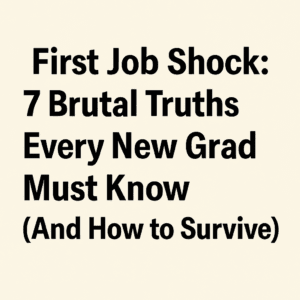First Job Shock: 7 Brutal Truths Every New Grad Must Know (And How to Survive)
Gaurav Chintamneedi’s candid LinkedIn post resonated because it exposes the jarring shift many graduates face. Moving cross-country for his e-commerce management role, he traded imagined “early-20s dream life” for 60-hour weeks, 3 AM starts, and near-constant weekend work.
The physical exhaustion left him isolated, too drained even on rare days off to build connections in his new city, leading to a profound identity crisis: “Did I peak in college?” Crucially, his message isn’t complaint—it’s solidarity. He validates the hidden struggle of countless young professionals: the disillusionment, isolation, and doubt are painfully common yet rarely discussed. His experience underscores that this overwhelming phase is a grueling transition, not a permanent peak, and acknowledging its difficulty is the first step toward resilience and eventual recalibration of expectations in the crucible of reality.

First Job Shock: 7 Brutal Truths Every New Grad Must Know (And How to Survive)
Gaurav Chintamneedi’s honest LinkedIn post struck a nerve. Waking at 3 AM, working 95% of weekends, and feeling too drained on his single day off to do anything but scroll – his description of life one year out of Chapman University, now an assistant store manager for a major e-commerce company, wasn’t a complaint. It was a raw snapshot of a reality shock experienced by countless new graduates, often in silence.
His story resonates because it shatters the curated illusion. We’re bombarded with images of the “early-20s dream”: seamless transitions into fulfilling 9-5 roles, vibrant social lives blooming effortlessly in new cities, weekends brimming with brunch and self-improvement. Gaurav, moving halfway across the US to the DMV area, expected this script. Reality delivered 60-hour weeks, pre-dawn alarms, and profound isolation.
The Crushing Weight of the “Adjustment”:
- The Physical Toll: Consistently long hours (50-60/week) and disruptive sleep patterns (3 AM starts) aren’t sustainable quirks; they’re a recipe for chronic exhaustion. As Gaurav described, even designated “time off” becomes recovery time, not living time.
- The Social Void: The dream of post-work drinks and spontaneous friendships evaporated. Building connections in a new city felt impossible amidst the grind. Time for existing relationships, often thousands of miles away, was squeezed into exhausted fragments.
- The Identity Crisis: “Did I peak in college?” This haunting question reveals a deeper struggle. The structure, social validation, and clear purpose of university life vanish. Suddenly, work consumes everything, leaving many wondering, “Is this all there is?” and “Who am I now?”
Why Gaurav’s Message Matters (Beyond Going Viral):
He wasn’t seeking sympathy; he was building solidarity. His core message is vital:
- You Are Not Alone: The feelings of disillusionment, isolation, and doubt plaguing your first year (or few years) out of college are incredibly common, yet rarely discussed openly in professional settings. We suffer privately, thinking we’re failing.
- It’s Not About Peaking, It’s About Transition: This phase isn’t the peak of life; it’s a difficult, often jarring, transition. Moving from the structured environment of academia to the unstructured demands of full-time adulthood and corporate culture is a massive psychological shift. It’s harder than many anticipate.
- Validation is the First Step: Simply acknowledging that this period is hard, that struggling is normal, and that the glossy social media portrayals are incomplete, is powerful. It lifts the burden of shame.
Shifting the Perspective: From Survival to Growth
Gaurav’s experience, while extreme in its hours, highlights near-universal early-career challenges. The value lies in reframing this harsh reality:
- Resilience is Forged in Fire: Navigating this overwhelming period builds a unique resilience. You learn your limits, your capacity for stress, and what truly matters to you outside of work – even if you can’t access it yet.
- Clarity Emerges from Discomfort: This dissonance between expectation and reality forces crucial questions about values, priorities, and desired lifestyle. What are you willing to sacrifice? What is non-negotiable? This discomfort, while painful, is foundational for future intentional choices.
- Seek Connection, Not Just Endurance: Gaurav’s isolation underscores the critical need to proactively seek support – whether through online communities (like the one responding to his post), reconnecting with old friends authentically, finding even one colleague to confide in, or seeking professional counseling. Suffering alone magnifies the struggle.
- This is (Probably) a Phase, Not Forever: For most, the first job or the intense initial years are not the entire career trajectory. Skills are built, leverage is gained, and opportunities for better balance often emerge with experience and deliberate career moves.
The Takeaway: Embrace the Messy Middle
Gaurav Chintamneedi gave voice to the unglamorous, exhausting, and emotionally complex “messy middle” that defines many graduates’ entry into the workforce, especially in demanding roles or new locations. His story isn’t just about long hours; it’s about the profound human adjustment to a new life stage.
If you’re in this phase, feeling disconnected, disillusioned, or simply bone-tired, remember: your struggle is valid, it’s shared, and it doesn’t define your future. It’s the difficult, often unseen, work of building the foundation for what comes next. Acknowledge the hardship, seek connection, learn from the discomfort, and know that adjusting takes time – and that’s perfectly okay. The “dream” isn’t dead; it’s being recalibrated in the crucible of real life.
You must be logged in to post a comment.